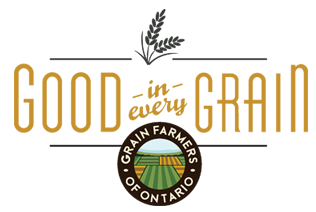Soil health tips for your gardens!

Yesterday we talked about World Soil Day and how important soils are to #YourFarmers growing Ontario grains. But, did you know many of these practices farmers use on their grain farms may apply to a small garden as well?
When dealing with soil it is easy to remember that it is a living organism and has the same basic requirements as you or I: food, water, shelter, and air.
Here are eight tips from #YourFarmers farms that you can use in your backyard gardens:
- Test your soil. Know your soil. Grain farmers regularly test their soils to know what may be needed or what they are working with before making any management decisions.
- Add organic matter. Organic matter (OM) are decomposing plants, plant debris, roots etc. that is found naturally in a soil. Microorganisms in the soil break down OM to simple nutrients that plants use. OM is used continually so must be added regularly. Soils lose their physical structure becoming hard, compacted, and cloddy when OM is low. This can decrease soil pore space, where water and air reside. Gardeners can increase their OM amounts by adding compost, kitchen scraps, leaves, animal manure, and leaving plant debris like leaves on the soil,
- Incorporate the OM to soil to increase air, water and nutrients for plants. The microorganisms will need to do their job of breaking down the matter, so it needs to be tilled, mulches or worked into the soil to ensure it will be breaking down efficiently.
- Don’t forget nitrogen! Nitrogen is the most important nutrient for your garden’s health and is used to make plant grow, gives them their energy and green colour. Did you soil test indicate low nitrogen levels? Be sure to add some to your soil! Composted manure, coffee ground or planting bean crops are different ways to add nitrogen.
- Protect your top soil. Much like what grain farmers do in the fall, don’t forget to protect your topsoil by planting a protective layer. The top few inches of soil are the most valuable to your gardens health but also the most vulnerable to erosion. Try spreading wood chips, straw or other mulches over your garden or plant a cover crop like peas, wheat or grasses.
- Manage pests. Pests like weeds, insects or diseases can take over a garden (or grain field) pretty quickly if they’re not kept under control. Pesticides that destroy weeds, insects or diseases can be used but they are other alternatives. Rotating crops, removing insects by hand, pulling weeds, tillage between the rows, and removing sick plants can help keep pests under control. When using pesticides, use what is designed for your plants pests and be sure to follow the label instructions carefully.
- Rotate crops. We said this briefly above, but rotating what plants/crops are planted in each section of the garden each year has many benefits. It can help keep soils healthy by limiting the nutrients removed, can add nutrients back into the soil, can manage pests and doesn’t let the soil become depleted in the same areas each year.
- Check your garden for contaminants. If your growing a garden in an urban setting be sure to check the soil for contaminants before planting or working the area tat could hurt your or your plants down the road.
